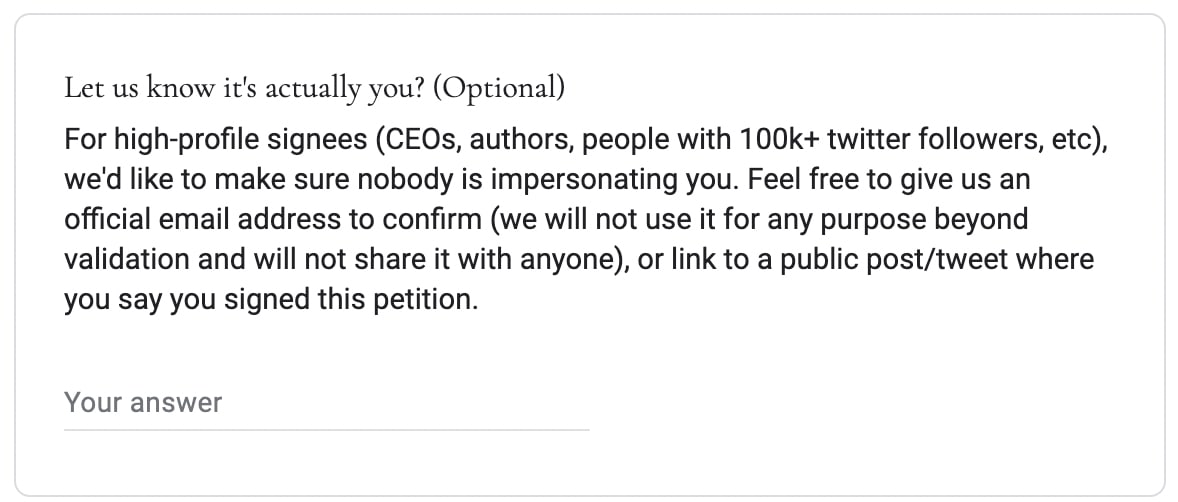We call on all AI labs to immediately pause for at least 6 months the training of AI systems more powerful than GPT-4.
AI systems with human-competitive intelligence can pose profound risks to society and humanity, as shown by extensive research and acknowledged by top AI labs. As stated in the widely-endorsed Asilomar AI Principles, Advanced AI could represent a profound change in the history of life on Earth, and should be planned for and managed with commensurate care and resources. Unfortunately, this level of planning and management is not happening, even though recent months have seen AI labs locked in an out-of-control race to develop and deploy ever more powerful digital minds that no one – not even their creators – can understand, predict, or reliably control.
Contemporary AI systems are now becoming human-competitive at general tasks, and we must ask ourselves: Should we let machines flood our information channels with propaganda and untruth? Should we automate away all the jobs, including the fulfilling ones? Should we develop nonhuman minds that might eventually outnumber, outsmart, obsolete and replace us? Should we risk loss of control of our civilization? Such decisions must not be delegated to unelected tech leaders. Powerful AI systems should be developed only once we are confident that their effects will be positive and their risks will be manageable. This confidence must be well justified and increase with the magnitude of a system's potential effects. OpenAI's recent statement regarding artificial general intelligence, states that "At some point, it may be important to get independent review before starting to train future systems, and for the most advanced efforts to agree to limit the rate of growth of compute used for creating new models." We agree. That point is now.
Therefore, we call on all AI labs to immediately pause for at least 6 months the training of AI systems more powerful than GPT-4. This pause should be public and verifiable, and include all key actors. If such a pause cannot be enacted quickly, governments should step in and institute a moratorium.
AI labs and independent experts should use this pause to jointly develop and implement a set of shared safety protocols for advanced AI design and development that are rigorously audited and overseen by independent outside experts. These protocols should ensure that systems adhering to them are safe beyond a reasonable doubt. This does not mean a pause on AI development in general, merely a stepping back from the dangerous race to ever-larger unpredictable black-box models with emergent capabilities.
AI research and development should be refocused on making today's powerful, state-of-the-art systems more accurate, safe, interpretable, transparent, robust, aligned, trustworthy, and loyal.
In parallel, AI developers must work with policymakers to dramatically accelerate development of robust AI governance systems. These should at a minimum include: new and capable regulatory authorities dedicated to AI; oversight and tracking of highly capable AI systems and large pools of computational capability; provenance and watermarking systems to help distinguish real from synthetic and to track model leaks; a robust auditing and certification ecosystem; liability for AI-caused harm; robust public funding for technical AI safety research; and well-resourced institutions for coping with the dramatic economic and political disruptions (especially to democracy) that AI will cause.
Humanity can enjoy a flourishing future with AI. Having succeeded in creating powerful AI systems, we can now enjoy an "AI summer" in which we reap the rewards, engineer these systems for the clear benefit of all, and give society a chance to adapt. Society has hit pause on other technologies with potentially catastrophic effects on society. We can do so here. Let's enjoy a long AI summer, not rush unprepared into a fall.
Signatories include Yoshua Bengio, Stuart Russell, Elon Musk, Steve Wozniak, Yuval Noah Hariri, Andrew Yang, Connor Leahy (Conjecture), and Emad Mostaque (Stability).
Edit: covered in NYT, BBC, WaPo, NBC, ABC, CNN, CBS, Time, etc. See also Eliezer's piece in Time.
Edit 2: see FLI's FAQ.
Edit 3: see FLI's report Policymaking in the Pause.
Edit 4: see AAAI's open letter.

Yeah, that seems more or less correct long-term to me. By long term I mean, like, definitely by the end of 2025. Probably a lot sooner. Probably not for at least 6 months. Curious if you disagree with those bounds. If you're interested in helping build non-first-strike defensive ais that will protect me and people I care about, I'd be willing to help you do the same. In general, that's my perspective on safety: try to design yourself so you're bad at first strike and really good at parry and if necessary also at retaliate. I'd prioritize parry, if possible. There are algorithms that make me think parry is a long term extremely effective move, but you need to be able to parry everything, which is pretty dang hard, shielding materials take energy to build.
I'm pretty sure it's possible for everyone to get a defensive agi. everyone gets a fair defense window, and the world stays "normal" ish, but now with scifi forcefield-immunesystems protecting everyone from everyone else.
also, please don't capture anyone's bodies from themselves. it's pretty cheap to keep all humans alive actually, and you can invite everyone to reproduce their souls through AI and/or live indefeinitely. This is going to be crazy to get through, but let's build star trek, whether or not it looks exactly the same economically we can have almost everyone else good about it (...besides warp) if things go well enough through the agi war.